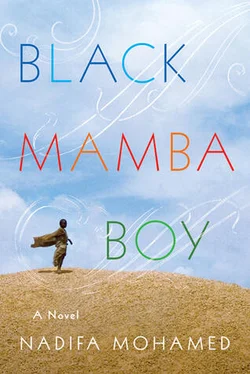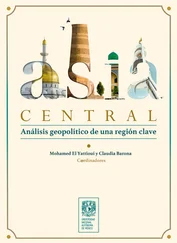The soldiers grew boisterous, shouting and jumping from seat to seat in play fight. Most of them were in their late teens and full of fizz. They lit cigarettes and sang raucous songs; they seemed like holidaymakers rather than an imperial army. Any passing girls were subjected to catcalls and groins pressed against the bus windows. The older soldier at the front of the bus looked on with fatherly good humor. But they left Jama alone, seeming to forget about his presence completely as the bus followed the course of a wide river west toward Sudan. Despite the hot plains, the river nourished enough earth to feed farms and wild date palms. Cows, rare in Somaliland, here grazed happily in large herds. The end of the trip was quiet; the soldiers had tired themselves out with laughing and now slept on each other’s shoulder, trickles of drool staining their uniforms. After passing idyllic riverside villages tilled by dark-skinned, brightly clothed people, Jama arrived at a checkpoint outside Omhajer. It was the last stop in Eritrea. Armed Italian soldiers boarded the bus. They made a show of looking over Jama and the woman. Through the dirty window more Italians could be seen waiting behind sandbags, a machine gun aimed at the bus. A checkpoint guard shoved his watch in the gangly soldier’s face and gesticulated to the darkening plains. The young soldiers peered out of the sand-blown windows and reached for their guns. Their officer placed a calming hand on the checkpoint guard’s shoulder, but he thrust the hand away, angry cords in his neck protruding as he continued to rage. The young Italians were silent, and the Eritrean woman whispered in Jama’s ear — patriots had attacked the checkpoint and stolen a truck. Jama stifled a giggle behind his hand.
Omhajer was swamped with military tents and food stalls run by former askaris. The town swung to a military beat and sweat glistened on the men’s unshaven faces. The pulse of the town stopped for a moment when the Eritrean woman disembarked the bus: cobblers stopped cobbling, merchants stopped selling, and jaws paused in midsentence. Men who had got used to the hard angles of male bodies now fixed their eyes on undulating curves, and nearly died of delight. The woman felt the heat of their eyes burning away her clothes and rushed down the dusty path toward her village. Jama saw Somali, Eritrean, and yellow-skinned Libyan askaris standing about, but none looked friendly, their faces were contorted and imbecilic with lust.
Behind the straw back of a stall, Jama counted his abattoir money and let out a desperate sigh. It was barely enough to buy food, never mind pay for another bus or lorry into Sudan. Jama sprinted out into the streets, cheetah-fast, hunting for groups of Somali askaris, running close to a clump before realizing they were Eritrean and skidding on his heels. Askaris turned and watched the strange boy run in and out of alleys. A Somali askari yelled out, “Hey, what are you looking for, kid?”
“A clansman, an Eidegalle askari!” shouted Jama.
The askari laughed. “Well, you can stop running, you’ve found one!” Jama ran to him; the soldier had a kind face, he put a thin hand on Jama’s head.
“Why are you looking for me, then?”
Jama cleared his throat and began, “I need help finding my father, he lives in Sudan but he used to be an askari.”
“Who is your father?” interrupted the soldier, a cigarette in his hand.
“He is Guure Mohamed Naaleyeh,” panted Jama.
The soldier exploded in laughter, coughing out a dark haze. “You’re Guure’s son?” he said, eyes round in delight.
Jama nodded, folding his arms around his bare chest.
“Waryaa! Everyone come and look! It’s Guure’s son!” More laughing men approached Jama, they slapped him on the back and manhandled his shoulders.
Jama stayed silent as they poked him and pointed out his father’s nose, or argued over whether Jama had the same slouched posture. They were close enough for Jama to smell the wood smoke and sweat on their uniforms. The first askari broke through the crowd and pulled Jama away. “Where have you come from?”
“Hargeisa.”
“By all the saints, do not lie to me.”
“Wallaahi, I swear, I came from Hargeisa.”
The askari was silent, and Jama could hear the others throwing his father’s name around as if he were a long-lost brother.
The askari held Jama’s hand. His dark skin matched Jama’s exactly, and their slender fingers merged indistinguishably. Jama looked hopefully into the man’s thin, angular face. “Your father is a good friend of mine, of us all. He was always telling me about his son, his strong little warrior, he would threaten us with your vengeance, but look at you! You’re nothing but a few bones strung together.”
“I would kill for my father,” Jama protested. “Anything he wants I would do! How can I get to him?”
“There are no buses to Gedaref, only military vehicles, and the Italians do not allow passengers, but you can get a ride with one of the Sudanese merchants here. It is only a few hours’ drive, but they leave only once a week and they charge a hefty sum,” the askari explained. Jama’s heart was racing. He didn’t want to spend any time in this garrison town but it was dawning on him that he would be forced to.
The askari read the dejection in his face. “We can get a message out to him, though, tell him you’re coming.”
Jama’s eyes reddened. All the fatigue and strain and misery of the journey had reached a crescendo at its near end and came pouring out. He turned to hide his face, and the soldiers looked to one another for solutions.
“Don’t worry, while you are here, you are my guest, you will sleep in my tent, eat my food, learn how to be an askari; this is the least I could do for Guure,” proposed the first askari.
The askari led him to a long row of identical canvas tents, stopping at one of them to pull aside the flap. “This is it, have a rest. If you need me I will be five tents down on the left. I will bring you a bite to eat soon.” Jama entered the gloomy tent and collapsed onto the dirt floor.
After a night on a sweaty borrowed mat, with soldier food lying badly digested in his guts, his skin red and swollen from the attacks of mosquito hordes, Jama decided to get up. His arms, legs, and back ached but he needed to find out more about his father. He shook the flap of the tent the askari had directed him to the previous night, and a man’s voice shouted, “If you are not the devil, come in!”
Jama went inside; five men were on the floor, bundled over one another in the cramped space. “Hello, Guure’s son,” the askari said; other askaris groaned, placed their arms over their heads to block out the sound disturbing their sleep.
“Hello,” said Jama, looking around the spartan tent, pleased he was finally someone’s son.
“What brings you here so early?” asked the askari. He reached in his trouser pocket for his toothstick, a thin twig with a splayed fibrous end.
“I want to know more about my father,” replied Jama, as if it was his due. He squatted in the corner and waited as the man eased the toothstick over each tooth, spitting out its fibers.
“You don’t even know my name yet, you little suldaan! I’m Jibreel. Guure is a great friend of mine, he is a happy, generous man, and the best company you can find. When we marched, we used to jostle to be close to Guure, so we could hear his jokes and impressions. He mimicked everyone to perfection, especially the Eritrean bulabashas — time would just fly by. He was always first to start off the marching songs. Do you have a beautiful voice like him?”
Jama shook his head regretfully.
“He talked about you a lot, you know. He would sometimes get word of you from askaris who had lived in Aden and knew your mother. He was proud of you.”
Читать дальше
Конец ознакомительного отрывка
Купить книгу












